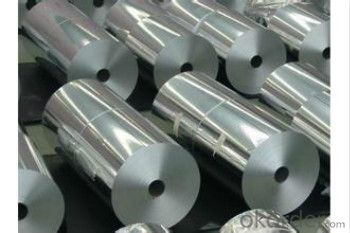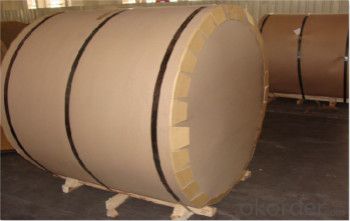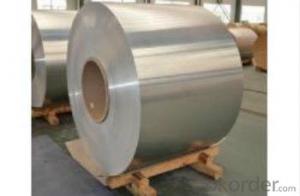Mill Finished Aluminium Coil AA1050 Temper H16
- Loading Port:
- Shanghai
- Payment Terms:
- TT or LC
- Min Order Qty:
- 3 m.t.
- Supply Capability:
- 3000 m.t./month
OKorder Service Pledge
OKorder Financial Service
You Might Also Like
Item specifice
1. Aluminum Coil Description:
Aluminum coil, is a rolled product, produced in a coiled form of continuous strip, and having an ID (Inner diameter) and OD (Outer diameter).Common alloy coil are used for a wide variety of applications, alloy 1050, 1060, 3003, 3105, 3005, 5052, 5754, 5083, 6061, 8011, 8021, and so on, in thickness from 0.0065-7mm, in width from 300- 2200mm.
2.Main Features of the Aluminum Coil:
• Great ductility
• Heat conductivity
• Anti-corrosion
• Moisture resistanve
3.Aluminum Coil Images


4.Aluminum Coil Specification
Aluminum Coil/Sheet | |
Main Specification | |
Alloy | AA1xxx (AA1050, AA1060, AA1070, AA1100 etc.) |
AA3xxx (AA3003, AA3004, AA3005, AA3105 etc.) | |
AA5xxx, AA6XXX (AA5052,AA5083, AA5754, AA6061, AA6062 etc.) | |
AA8xxx(AA8011, AA8006, AA8079 etc.) | |
Temper | H14,H16, H18, H22, H24, H26, H32,O/F |
Thickmess | ≥0.2mm |
Width | 30mm-2100mm |
Standard | GB/T 3880-2006 |
Special specification is available on customer's requirement | |
5.FAQ
We have organized several common questions for our clients,may help you sincerely:
(1) How to guarantee the quality of the products?
We have established the international advanced quality management system, every link from raw material to final product. we have strict quality test; we resolutely put an end to unqualified products flowing into the market. At the same time, we will provide necessary follow-up service assurance.
(2) MOQ?
For trail order, we accept 5 MT.
(3) Payment term?
30% deposit, balance against the BL copy; 100% L/C at sight
(4) What is the delivery time?
Depends on actual order, around 30 to 35 days
- Q:I'm having trouble with another chem problemAluminum sulfide reacts w/water to form aluminum hydroxide and hydrogen sulfide. Write the balanced chemical equation for this reaction and find how many grams of aluminum hydroxide are obtained from 14.2 g of aluminum sulfide.I already found the balanced equation but I need help on finding how many grams of aluminum hydroxide are obtained from 14.2 g of aluminum sulfide. Can someone please explain how it's done?
- No way!! because of the fact inspite of the bat, the helmet and the shin guards the undergo is plenty larger than a human and is going to basically get mad from the bat and kill you. Nope $800,000 isn't something for that!
- Q:Are aluminum coils suitable for interior design applications?
- Yes, aluminum coils are suitable for interior design applications. Aluminum is a versatile material that offers durability, lightweight properties, and resistance to corrosion. It can be easily shaped, painted, or coated to match various design aesthetics. Additionally, aluminum coils are commonly used for decorative purposes like ceiling panels, wall cladding, and furniture components, making them a popular choice in interior design projects.
- Q:Aluminum roll 220 kg.0.3 thickness, 500 width, roll diameter is how much?
- You can use the outside diameter, the inner diameter and the width to get the volume. You know the density and volume, and then you can find the weight naturally
- Q:Can aluminum coils be used for seamless gutters?
- Yes, aluminum coils can be used for seamless gutters. Aluminum is a popular choice for seamless gutter installations due to its durability, lightweight nature, and resistance to corrosion. The coils can be easily shaped and formed to create a seamless gutter system that effectively directs rainwater away from the building.
- Q:Can aluminum coils be used in the production of architectural panels?
- Yes, aluminum coils can be used in the production of architectural panels. Aluminum is a versatile material that is widely used in the construction industry due to its lightweight, durability, and corrosion resistance. Aluminum coils, which are typically made by rolling aluminum ingots into thin, flat sheets, provide a convenient and efficient way to produce architectural panels. Architectural panels, such as aluminum composite panels (ACP) or solid aluminum panels, are commonly used as cladding systems for buildings. These panels serve both functional and aesthetic purposes, providing weather protection, insulation, and enhancing the overall appearance of the structure. Aluminum coils are used in the production of architectural panels because they can be easily formed and shaped into various panel designs, such as flat sheets, corrugated panels, or custom profiles. The coils can be cut to size and then processed through various techniques, including bending, folding, punching, or welding, to create the desired panel shape and dimensions. Furthermore, aluminum coils offer a wide range of finishing options, such as anodizing, powder coating, or painting, which allows for customization and enhances the aesthetic appeal of architectural panels. These finishes not only provide color options but also improve the durability and weather resistance of the panels. In summary, aluminum coils are suitable for the production of architectural panels due to their versatility, durability, and aesthetic options. Their use in the construction industry has become increasingly popular, as they offer a cost-effective and efficient solution for creating high-quality panels that meet the functional and design requirements of modern architecture.
- Q:What are the different coil widths available for aluminum coils?
- The coil widths available for aluminum coils can vary depending on the specific requirements and manufacturing capabilities. However, common standard coil widths for aluminum coils typically range from 12 inches (304.8 mm) to 60 inches (1524 mm). These standard widths are commonly used in various industries, including construction, automotive, and packaging. In addition to the standard widths, manufacturers can also provide custom coil widths to meet specific customer needs. These custom widths can be narrower or wider than the standard range, allowing for more flexibility in design and application. It is important to note that the availability of specific coil widths may vary depending on the supplier and the specific aluminum alloy being used. Therefore, it is recommended to consult with a reputable aluminum coil supplier to determine the exact range of coil widths available for a particular project or application.
- Q:How do aluminum coils contribute to the durability of roofs and facades?
- The durability of roofs and facades is greatly enhanced by aluminum coils, thanks to their inherent properties and design characteristics. Firstly, aluminum's resistance to corrosion makes it an ideal material for roofs and facades that are constantly exposed to harsh weather conditions. This corrosion resistance ensures that the coils remain unaffected by moisture, UV rays, and extreme temperatures, thus extending the lifespan of the entire roofing or facade system. Moreover, aluminum coils provide structural integrity to roofs and facades while being lightweight. This lightweight nature simplifies the installation process and reduces the load on the building's structure, which is particularly advantageous for larger structures. Despite their lightness, aluminum coils have high tensile strength, enabling them to withstand significant loads and pressure without warping or deforming. This strength enhances the overall stability and durability of the roof or facade, ensuring resistance against external forces like wind, snow, and hail. Furthermore, aluminum coils are highly malleable, allowing for easy customization during the manufacturing process. This flexibility enables the coils to be shaped and formed to fit various architectural designs, resulting in a seamless and aesthetically pleasing appearance. The ability to customize the coils also facilitates efficient installation, as they can be tailored to fit different dimensions, angles, and contours of roofs or facades. Additionally, aluminum is a non-combustible material, which makes it an excellent choice for roofs and facades in terms of fire safety. The non-combustible nature of aluminum coils greatly reduces the risk of fire spreading, providing an extra layer of protection to both the building and its occupants. In conclusion, aluminum coils significantly contribute to the durability of roofs and facades by offering corrosion resistance, lightweight yet high tensile strength, malleability for customization, and non-combustibility. These properties ensure that the roof or facade can withstand the test of time, harsh weather conditions, and external forces, making aluminum coils a reliable and long-lasting choice for any building structure.
- Q:Can aluminum coils be used for automotive body panels?
- Certainly, automotive body panels can be made using aluminum coils. In fact, aluminum is gaining popularity in the automotive sector due to its numerous advantages. Its lightweight nature contributes to enhanced fuel efficiency and overall vehicle performance. Furthermore, aluminum exhibits exceptional resistance to corrosion, making it a durable option for automotive body panels. Additionally, aluminum can be easily shaped and molded, enabling intricate designs and improved aerodynamics. All in all, utilizing aluminum coils for automotive body panels presents a viable choice with a multitude of benefits.
- Q:What is the maximum yield strength of aluminum coils?
- The maximum yield strength of aluminum coils can vary depending on the specific alloy and temper of the aluminum. However, in general, aluminum coils typically have a yield strength ranging from 10,000 to 40,000 psi (pounds per square inch). It is important to note that different alloys and tempers of aluminum have different properties and therefore different maximum yield strengths. Additionally, the thickness and width of the aluminum coils can also affect their maximum yield strength. Therefore, it is recommended to consult the manufacturer's specifications or standards for the specific alloy and temper of the aluminum coils to determine their maximum yield strength.
- Q:What is the role of aluminum coils in the construction of railways?
- The construction of railways heavily relies on aluminum coils, which possess unique properties and advantages. These coils are widely utilized in the manufacturing of railway tracks and train cars. One of the primary functions of aluminum coils in railway construction is their contribution to lightweighting. Aluminum, being a lightweight material, is ideal for reducing the overall weight of railway components. This is significant because lighter trains and tracks require less energy for operation, leading to improved fuel efficiency and reduced operating costs. Additionally, the decreased weight of aluminum components allows for increased payload capacity, enabling trains to carry more passengers or freight. Another crucial role of aluminum coils lies in their corrosion resistance. Railways are exposed to various environmental conditions, such as moisture, salt, and extreme temperatures. Aluminum possesses excellent corrosion resistance properties, making it highly durable and long-lasting even in harsh environments. This diminishes maintenance and replacement costs associated with rust and corrosion, ensuring the longevity and reliability of the railway infrastructure. Furthermore, aluminum coils offer excellent conductivity, which is essential for electrical and signaling systems in railways. Aluminum's high electrical conductivity facilitates efficient power transmission and distribution, enabling seamless communication between trains, signaling devices, and control systems. This contributes to the safety and efficiency of railway operations. Moreover, aluminum coils can be easily formed and fabricated into various shapes, providing flexibility in railway design and construction. This versatility allows for the production of customized railway components, such as curved tracks or aerodynamic train carriages, to meet specific project requirements. In conclusion, the indispensable role of aluminum coils in railway construction is attributed to their lightweight, corrosion-resistant, conductive, and versatile nature. Their incorporation into railway infrastructure results in various benefits, including enhanced fuel efficiency, reduced maintenance costs, improved safety, and the ability to design and construct innovative railway systems.
1. Manufacturer Overview |
|
|---|---|
| Location | |
| Year Established | |
| Annual Output Value | |
| Main Markets | |
| Company Certifications | |
2. Manufacturer Certificates |
|
|---|---|
| a) Certification Name | |
| Range | |
| Reference | |
| Validity Period | |
3. Manufacturer Capability |
|
|---|---|
| a)Trade Capacity | |
| Nearest Port | |
| Export Percentage | |
| No.of Employees in Trade Department | |
| Language Spoken: | |
| b)Factory Information | |
| Factory Size: | |
| No. of Production Lines | |
| Contract Manufacturing | |
| Product Price Range | |
Send your message to us
Mill Finished Aluminium Coil AA1050 Temper H16
- Loading Port:
- Shanghai
- Payment Terms:
- TT or LC
- Min Order Qty:
- 3 m.t.
- Supply Capability:
- 3000 m.t./month
OKorder Service Pledge
OKorder Financial Service
Similar products
New products
Hot products
Related keywords




























